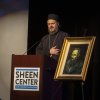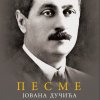Bishop Maxim (Vasiljevic)
A talk delivered at a painting exhibit “Saved by Beauty: Dostoevsky in New York” at The Sheen Center
New York, April 5, 2022
Your Eminence Timothy Cardinal Dolan, Archbishop of New York of the Roman Catholic Church,
Your Grace Bishop Irinej of Eastern America of the Serbian Orthodox Church,
Very Reverend Archimandrite Nektarios Papazafiropoulos, Chancellor of the Greek Orthodox Archdiocese of America,
Kindly allow me to congratulate The Sheen Center for Faith and Culture and Mr. David DiCerto for welcoming the idea of hosting an exhibit during the Paschal Spring in the Big Apple dedicated to Fyodor Mikhailovich Dostoevsky. Having toured Greece and making its New York premiere at The Sheen Center, this exhibit spans two floors and gives visual expression to characters and existential and moral themes from the novels of Fyodor Dostoevsky through a variety of painting styles by 15 artists.My sincere gratitude goes to His Eminence Archbishop Elpidophoros of the Greek Archdiocese, who embraced the proposal of sponsoring and promoting this crucial exhibit.
I thank St. Sebastian Press & Art from Los Angeles and its manager Ms. Radmila Bojovic for taking upon her shoulders the burden of preparing this visual tribute to the 200th anniversary of the birth of Fyodor Dostoevsky (1821-2021) in the USA by transferring the works from Athens to Los Angeles, New York, Boston, etc.
Indeed, I am greatly delighted that I can be here tonight with all of you, who so cherish and appreciate Beauty, which will truly Save the World!
The bicentenary celebration of the birth of the great Russian author Fyodor Dostoevsky, considered one of the most outstanding writers of modern literature, has found the world in an increasing state of bewilderment. Some, including myself, believe that the dynamic and open anthropology of this classic can help rectify an issue because it has the power to break the defensive armor of the modern ego and take us beyond its ideological constraints.
The paintings on the walls of this gallery show Dostoevsky, a man, dressed in flesh and blood, who lives, suffers, falls, and rises. At the same time, these paintings are a result of a “non-Euclidean” reading of that reality. Fyodor creates art or beauty by confessing what is in his soul, hence its astonishing persuasiveness.
The depth and contradictoriness of his heroes have made systematic psychological theories look shallow by comparison. Aware of the relativity of categories of morality in human life, this Russian writer was the first to show that the physical and psychological boundaries within the context of human diversity are neither so clear nor unyielding.
The painters of the visual group “OCHRA” have attempted to visually express this world of hopeless, dark heroes and others, positive heroes, who have experienced repentance. According to Fr Stamatis Skliris, “this exhibition shows many visual trends. Some works are more emotional and more romantic, or even darker. Some seek to describe scenes from Dostoyevsky’s novels; some are portraits of his heroes, others, more existential, penetrate the Dedicated streets of the psychic world, while some move into a spiritual bullet showing spiritual points and messages broadcasting the work of the great writer. The entire exhibition awakens our spiritual restoration and serves as a reminder of the first literary adventures of the psychological novel. It expresses nostalgia for the great literary genre called novel, which was popular in the author’s years, and nowadays it fades away.”
Fyodor Mikhailovich Dostoevsky’s work, according to Fr. Stamatis, is like a submarine diving into the bottomless depths of the human soul and photographing its Dedalian landscapes to present them before our eyes as a realistic image of enigmatic existence, which, as long as there is, fights nonexistence.
Dostoevsky’s sense of evil and his love of freedom made him especially relevant in a century of world wars, mass murders, and totalitarian systems.
His portrait suggests a person who lived the experience of seeing an abyss before him, and he looks at nothingness directly with his eyes. The great writer is characterized by eternal restlessness of spirit, and he insists (constrained by this effort) on a twofold feeling that we would call, “waiting for the arrival of nothingness.” It is as if he is above the abyss and watching his pens and notebooks flee, his table sliding, and his body, his house, above the abyss. He lived this feeling so intensely that it permeates his existence with the atmosphere of various scenes that he creates with his imagination in his work.
The gaze of the long-suffering, but blessed Dostoevsky crystallizes in that portrait. When we look at him and his eyes and then his torn coat, we can say: this man has gone through a storm, yet his eyes possess a sweetness that says: Thank God, we are saved!
Therefore, according to Metropolitan John Zizioulas, “Dostoevsky brings us to the edge of the abyss but does not leave us to fall into the abyss.” And Dostoevsky’s message to everyone is: “Compassion is the most important and, perhaps, the only law of existence for the whole of all mankind.” In his prodigious literary works, this Russian novelist and short-story writer refer to repentance and redemption as preconditions of becoming God-like.
And I truly hope that there will be more members and successors of the “Ochra group”, who will continue this work deeply inspired of the exceeding marvelousness of Dostoyevsky’s insight.
May I, once again, express my profound gratitude to The Sheen Center, which has fostered this exhibition, and I say that also as a Bishop of the Serbian Orthodox Church, expressing as such, the appreciation of His Holiness our Serbian Patriarch Porfirije.
Thank you very much!






